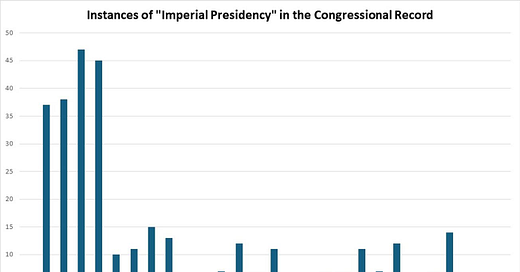The Imperial Presidency
Complaints about an “Imperial Presidency” started with Nixon, but debate in the law journals has long involved an Imperial Administrative State.
Quick note.
The constitutional “separation of powers” has been much in the news the last few days as the Trump Administration banished a few hundred Venezuelan gangbangers to a Salvadoran klink. (Why to a prison in El Salvador and not Venezuela is an outstanding question.) A federal judge had ordered the two plane-loads of illegal aliens to return to the United States, but, as I understand the matter, the Administration observed that the planes were already over international waters. Too late!
Advocates for criminal, alien gangbangers decry the lack of “due process,” the larger demand being that the Executive doesn’t have the authority to unilaterally expel such people from the United States. Implicitly, some larger process is contemplated. But, what process? Criminal, alien gang members should be granted free passage and residency? They should be granted the full menu of rights that attends citizenship?
Other observers suggest (correctly, I think) that images like this one makes for good politics… for the Administration:
The matter encompasses the question of “checks-and-balances” or the “separation of powers” in constitutional governance. The courts have some scope for reviewing executive action. Even the infamous Executive Order 9066 (“Japanese Internment” in 1942) was subject to judicial review … and it managed to pass muster in the Supreme Court. (!) And now, should a district court judge be able to review, much less block, the Executive’s latest efforts to exercise its authority?
Government-by-Executive Order
The major party not in control of the White House decries the aggressive deployment of “executive orders” on the part of the sitting President. This is not a new phenomenon, and, with this in mind, I did a quick search for “Imperial Presidency” in the Congressional Record.
I found 337 instances of “Imperial Presidency” in speeches on the floors of the Senate and House of Representatives dating back to the Congressional term of 1971-72. What do we see?
Instances of “Imperial Presidency” really took off just around the defenestration of Richard Nixon from the Presidency. Puzzling (to me) is the fact that such expressions did not abate during the Carter years but rather increased. That said, they did abate somewhat, but “Imperial Presidency” seemed to have become comfortably ensconced in the legislative record, and it really only dropped off during the presidency of the functionally-absent Joe Biden. Interesting.
The leading item in my search was this nugget:
Mr. MESSER: Mr. Speaker, a headline in today's Roll Call reads: "White House, Democrats cry foul over GOP push to enforce immigration and other laws."
Really? The Constitution is clear about how our government is supposed to work. Congress makes the laws; the President enforces them. President Obama should know that, since he used to lecture about constitutional law.
The President isn't the first to stretch the bounds of executive authority, but the proper constitutional limits on the President's power are long in this administration's rearview mirror. He has disregarded laws that he disagrees with, even when they are his own.
The American people are demanding respect for the rule of law. They want our system of checks and balances restored so that their government reflects the will of all, not just one. That is why we passed the ENFORCE the Law Act yesterday, and that is why we will continue to demand the President do his job, not ours.
That was March 13, 2014.
A President chose not to exercise the Executive’s authority to enforce immigration law. Political opponents complained. Right now, a President endeavors to exercise the Executive’s authority to enforce immigration law. Political opponents complain.
The Trump Administration, meanwhile, has been rolling out a tremendous volume of executive orders relating to a broad range of policy issues. Executive orders are situated pretty low on the food chain of law in that one President can overturn another President’s executive orders by executive order. In contrast, laws that go through Congress can’t be undone so easily. They can be undone by Congress, which can be about as easy as getting them done in the first place (not easy), or they can be subject to judicial review and prospectively rendered unconstitutional (also not easy). But proper legislation can’t, in principle, be undone by a mere executive order.
Many observers celebrate the long train of Trump executive orders. These things mostly unravel the long train of Biden executive orders. But, the big question remains: Is this really the way to run government? Can’t we do better?
With this question in mind, I’ve started looking into the background of the Administrative Procedure Act of 1946, and one can see that it was motivated not by questions of Executive over-reach but more by questions of the over-reach of administrative agencies… which is interesting, because administrative agencies are part of the executive branch of government. The Executive does not run administrative agencies? The biggest question with respect to administrative over-reach, however, has involved the role of judicial oversight: How do we enable the judiciary to review administrative rulemaking activity? Should we enable the judiciary to review administrative rulemaking activity? There are plenty of people out there who may decry the ”Imperial Presidency,” but many of these same people decry the role of the judiciary in reviewing administrative activity. Why? Because, they believe in an Imperial Administrative State run by a cadre of unaccountable Imperial Mandarins. They believe in the Technocratic Conceit that administrative agencies should operate autonomously. The Executive should have no role in managing the executive branch, and the judiciary should have no role in reviewing administrative activity.






IMHO, the Imperial Presidency, the Imperial District Judges with their nationwide injunctions, and the Imperial Bureaucracy are the result of Congress abdicating its responsibility. Our elected Congress wants others to do the jobs they are supposed to do so they don't have to stick their necks out. This has evolved over time and the dynamic needs to change.